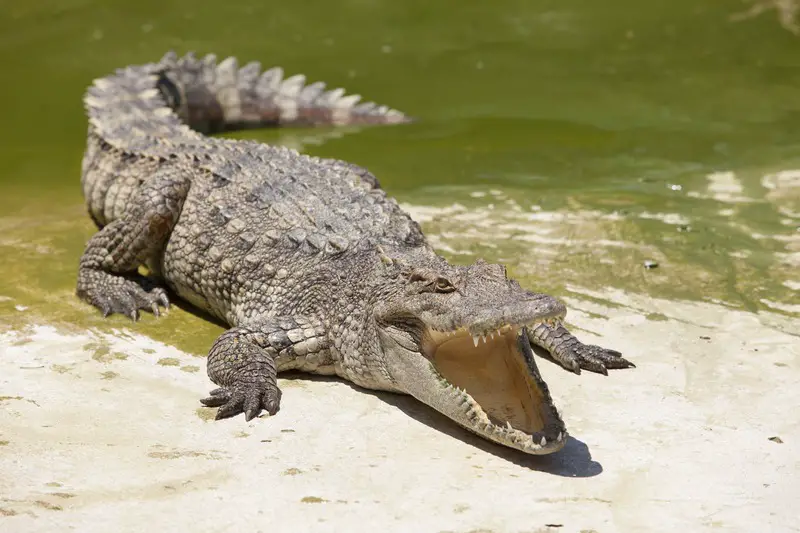An 80-year-old man from Indonesia lost his life to a 10-foot crocodile while bathing in a river near his home in Tanggamus Regency, Lampung Province, Sumatra, Indonesia, on June 30, 2025. The victim, known as Wasim, was pulled underwater by the reptile before he could call for help.
The incident was discovered when Yusron, a 40-year-old villager, noticed Wasim’s clothes left behind on the riverbank. With no sign of Wasim, Yusron gathered locals to search for him, and they witnessed the crocodile dragging Wasim’s body in the water.
Using sticks, the villagers pursued the crocodile along the Semaka River bank, attempting to rescue Wasim. They entered the shallow water and struck the crocodile until it released the victim.
Semaka Police Chief AKP Sutarto stated that Wasim was found at 1:00 p.m. Western Indonesia Time, about an hour after the crocodile emerged with him in its mouth. Sutarto confirmed, “after being struck several times, the crocodile finally released the victim’s body,” although Wasim was already deceased upon recovery.
Wasim’s son-in-law, Samugi, explained that the day began normally, with Wasim saying goodbye to his family before heading to the river.
The police chief noted that Wasim had jagged wounds on his back, buttocks, and shoulders. His family accepted the cause of death, and the body was released for funeral arrangements. Authorities have urged residents to exercise caution around rivers to avoid similar incidents.
Indonesia’s archipelago is home to 14 crocodile species, including large estuarine crocodiles. Conservationists attribute the rise in human-crocodile encounters to environmental factors affecting the crocodiles’ natural behavior.
Overfishing has reduced the reptiles’ natural food sources, and habitat loss due to coastal development has pushed them closer to human areas. Tin mining has also led villagers to encroach on crocodile habitats, bringing these animals nearer to residential zones.
River use for bathing and primitive fishing by some Indonesians contributes to the rise in attacks. According to CrocAttack, an independent database, Indonesia recorded 179 crocodile attacks in 2024, the highest globally, with 92 fatalities.
Since 1999, the saltwater crocodile has been legally protected in Indonesia, prohibiting hunting. As apex predators, they face no natural population control, allowing their numbers to grow in suitable habitats.
Crocodile handler Rusli Paraili, 39, is concerned about the increasing attacks and works on a farm in Budong-Budong, West Sulawesi, to keep crocodiles away from people. His operation is funded by government sources, community donations, and palm oil companies.
Paraili observed that attacks on Sulawesi Island started about 12 years ago, coinciding with palm oil plantation expansion near river mouths. Some companies constructed artificial waterways connected to the Budong-Budong River, leading crocodiles into residential areas.
Palm oil plantations now cover the landscape from the mountains to the coast in West Sulawesi. Residents have incorporated crocodile patrols into daily routines, using flashlights to check water pumps and scan canals. This reflects the new reality of coexisting with these predators where human development intersects with natural habitats.
Social media videos of crocodile sightings and attacks in Indonesia have increased, highlighting the rising interaction between humans and these protected predators across the nation.











